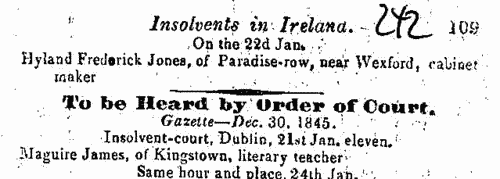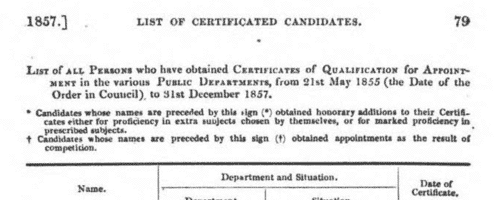Falvey Surname Ancestry ResultsOur indexes 1000-1999 include entries for the spelling 'falvey'. In the period you have requested, we have the following 53 records (displaying 11 to 20): Single Surname Subscription | | | Buying all 53 results of this search individually would cost £306.00. But you can have free access to all 53 records for a year, to view, to save and print, for £100. Save £206.00. More... |
These sample scans are from the original record. You will get scans of the full pages or articles where the surname you searched for has been found. Your web browser may prevent the sample windows from opening; in this case please change your browser settings to allow pop-up windows from this site. County Cork Freeholders: Booth No 3
(1841)
The poll books of voters in the parliamentary election for county Cork 13 to 15 July 1841 delivered in to the select committee that subsequently looked into the propriety of the proceedings, and then annotated with observations as to those votes to which objection had been raised. There are separate books for seven booths, with the electors' names in order of voting: giving each freeholder's full name, place of abode, situation of the freehold, value, number and date in the alphabetical registry book, and for which candidates they voted (Daniel O'Connell, Edmund Burke Roche, Nicholas Philpot Leader, and Robert Longfield). The seven booths are for these areas: 1. Duhallow barony; 2. Hall County Side, East East Carbery, West East Carbery and East West Carbery; 3. Barrymore and West West Carbery; 4. Condons and Fermoy; 5. Imokelly and West Muskerry.FALVEY. Cost: £6.00.  | Sample scan, click to enlarge

| County Cork Freeholders: Booth No 6
(1841)
The poll books of voters in the parliamentary election for county Cork 13 to 15 July 1841 delivered in to the select committee that subsequently looked into the propriety of the proceedings, and then annotated with observations as to those votes to which objection had been raised. There are separate books for seven booths, with the electors' names in order of voting: giving each freeholder's full name, place of abode, situation of the freehold, value, number and date in the alphabetical registry book, and for which candidates they voted (Daniel O'Connell, Edmund Burke Roche, Nicholas Philpot Leader, and Robert Longfield). The seven booths are for these areas: 1. Duhallow barony; 2. Hall County Side, East East Carbery, West East Carbery and East West Carbery; 3. Barrymore and West West Carbery; 4. Condons and Fermoy; 5. Imokelly and West Muskerry.FALVEY. Cost: £6.00.  | Sample scan, click to enlarge

| Householders of the parish of St Aldate's in the city of Oxford
(1841)
A parliamentary poll of the freemen and electors of the City of Oxford was taken 30 June 1841, the candidates being Donald Maclean (Mac), James Haughton Langston (Lan) and Neill Malcolm (Mal). The poll book records the names, addresses and occupations of the householders, district by district, as well as the names of the freemen of the city, and shows for whom they voted.FALVEY. Cost: £6.00.  | Sample scan, click to enlarge

|  London Policemen
(1830-1842) London Policemen
(1830-1842)
The Metropolitan Police Register of Joiners (MEPO 333/4) lists policemen joining the force through to 31 December 1842 (to warrant number 19892). The register is alphabetical, in so far as the recruits are listed chronologically grouped under first letter of surname. It is evidently a continuation of a similar earlier register, not closed until its alphabetical sections were filled: consequently, there are no entries in this register for the initial letters N, O, Q, U, V, X, Y or Z; and the sections of this register start at different dates - A 18 April 1840 (warrant number 16894); B 11 December 1830 (5570); C 7 September 1830 (4988); D 27 May 1833 (8445); E 15 December 1838 (14476); F 30 March 1832 (7372); G 1 December 1835 (11,184); H 25 April 1832 (7457); I and J 13 February 1837 (12449); K 2 January 1838 (13457); L 3 October 1834 (9905); M 15 November 1832 (7999); P 4 October 1831 (6869); R 4 September 1837 (13021); S 30 March 1835 (10366); T 6 April 1840 (16829); W 30 December 1833 (9096). The register gives Date of Appointment, Name, Number of Warrant, Cause of Removal from Force (resigned, dismissed, promoted or died), and Date of Removal. Although the register was closed for new entrants at the end of 1842, the details of removals were always recorded, some being twenty or more years later. Those recruits not formerly in the police, the army, or some government department, were required to provide (normally) at least two letters of recommendation from persons of standing, and details of these are entered on the facing pages: the names in these are indexed separately - this index refers only to the police constables. Where a recruit was only recently arrived in the metropolis, the names and addresses of the recommenders can be invaluable for tracing where he came from.FALVEY. Cost: £8.00.  | Sample scan, click to enlarge

| Insolvents in Ireland
(1846)
Perry's Bankrupt and Insolvent Gazette, issued monthly, included lists of insolvencies and stages in the process whereby the insolvents petitioned for release from debtors' prison. The insolvent is generally referred to by name (surname first), address and trade. This is the index to the names of Irish insolvents, from the issues from January to December 1846.FALVEY. Cost: £6.00.  | Sample scan, click to enlarge

| Civil Service Appointments
(1855-1857)
The Civil Service Commission published this annual list of all persons who had obtained certificates of qualification for appointment in the various public departments. The list gives full name (surname first); department (such as Post Office, or Inland Revenue); situation (such as Letter-carrier, or Clerk); and date of certificate. Candidates whose names are preceded by a dagger obtained appointments as the result of competition. Those whose names are preceded by an asterisk obtained honorary additions to their certificates either for proficiency in extra subjects chosen by themselves, or for marked proficiency in the prescribed subjects. This list covers the period from 21 May 1855 (the date of the original Order in Council) to 31 December 1857.FALVEY. Cost: £4.00.  | Sample scan, click to enlarge

| Customs Officers in London
(1858)
Complete lists of serving customs officers and clerks in the Port of London and all the outports of Britain and Ireland (including the Isle of Man and the Channel Islands) were published each year in The British Tariff. This issue is corrected to 30 September 1858: the sample scan shows the entry for Hartlepool.FALVEY. Cost: £6.00.  | Sample scan, click to enlarge

|  British infantry fighting in China
(1856-1860) British infantry fighting in China
(1856-1860)
The China Medal was awarded to soldiers and sailors who took part in the prosecution of the war against the Chinese from 1856 to 1860. Separate clasps were awarded for men who had been in receipt of the China Medal of 1842; for being actually present at Canton on 28 and 29 December 1857, when that city was bombarded and finally captured; for being actually engaged in the operations which ceased with the first capture of the Taku Forts, 20 May 1858, and led to the Treaty of Tientsin; for being actually present at the capture of the Taku Forts 21 August 1860; and for being actually present before Pekin the day the gate of that city was given up to the allied (British and French) army, viz. on 13 October 1860. The 67th (The South Hampshire) Regiment of Foot, based at Athlone, embarked for India 18 September 1858, and was transferred to China in 1859, taking part in the capture of the Taku Forts and Pekin, and the operations against the Taiping rebels in 1862 to 1863: the right wing was moved to Japan in 1864 for the occupation of Yokohama. The regiment returned to the Cape of Good Hope in 1865, and back to Ireland in 1866.FALVEY. Cost: £8.00.  | Sample scan, click to enlarge

|  British riflemen fighting in China
(1860) British riflemen fighting in China
(1860)
The China Medal was awarded to soldiers and sailors who took part in the prosecution of the war against the Chinese from 1856 to 1860. Separate clasps were awarded for men who had been in receipt of the China Medal of 1842; for being actually present at Canton on 28 and 29 December 1857, when that city was bombarded and finally captured; for being actually engaged in the operations which ceased with the first capture of the Taku Forts, 20 May 1858, and led to the Treaty of Tientsin; for being actually present at the capture of the Taku Forts 21 August 1860; and for being actually present before Pekin the day the gate of that city was given up to the allied (British and French) army, viz. on 13 October 1860. The 2nd battalion, the 60th (The King's Royal Rifle Corps) Regiment, based in Winchester, embarked for the Cape of Good Hope in June 1851, and after taking part in the Kaffir War, was moved to India, where it helped deal with the Mutiny. In 1860 the battalion was transferred to China. The regiment took part in the capture of the Taku Forts and that of Pekin.FALVEY. Cost: £8.00.  | Sample scan, click to enlarge

|  Sailors and marines on board Her Majesty's ship Magicienne
(1860) Sailors and marines on board Her Majesty's ship Magicienne
(1860)
The China Medal was awarded to soldiers and sailors involved in the various actions of the war against China, in which this ship was engaged in 1860. The medals were either delivered on board or sent on in 1862: except that many of the men were no longer immediately traceable, and the remarks on the roll show that some medals were not sent on for several years, and some were never sent. After the main roll there is a section showing which of the men also qualified for clasps. Separate clasps were awarded for men who had been in receipt of the China Medal of 1842; for the taking of Fatshan in 1857, Canton in 1857, Taku Forts in 1858, Taku Forts in 1860, and Pekin in 1860. Most of the men on this ship are shown as having been given the Taku Forts 1860 clasp, for being actually present at the capture of the Taku Forts 21 August 1860.FALVEY. Cost: £8.00.  | Sample scan, click to enlarge

|
Research your ancestry, family history, genealogy and one-name study by direct access to original records and archives indexed by surname.
|













